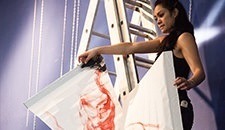FAQ for Future Students
What types of studies are offered by IESA Arts & Culture?
- Our MBA/Msc in Arts and Cultural Management, in partnership with Paris School of Business is fully taught in English. Students can apply after completing 4 year Bachelor's degree or equivalent. If a student has completed a 3 year Bachelor degree, the premaster bridge semester can be taken so that he/she is eligible for the MSc /MBA program.
Yes, IESA Arts & Culture has an international education department is dedicated to training students in English. Our department offers program from the Bachelor, first year through the MBA Level.
You may also do:
Bachelor in Arts Management after a High School diploma.
You can apply to one of our 3 MBA programs directly after your Bachelor degree or Premaster semester:
- MBA in Contemporary Art: Sales Display and Collecting
- MBA in Art and Luxury Management
- MBA in Performing Arts Management & Cultural Industries
Our diplomas are validated by the RNCP (French Government) at level 6 for the Bachelor's in Arts Management and at level 7 for the MBA programs.
Does IESA deliver diplomas that are recognized by the French government and world wide recognition?
All diplomas issued by IESA Arts & Culture are validated by the Registre National de Certifications Professionelles (RNCP, as it is known by its French acronym) and certified by the French government.
This certification is a guarantee of the level of quality of the graduate for employers. The RNCP measures the coherence between the knowledge and skills acquired by the graduates and the successful job placement following graduation.
IESA Arts & Culture delivers its diplomas on a Bachelor and Master level registered with the RNCP (Level 6 and 7) and are all recognized by the French government.
Our diplomas are recognized by European institutions and companies, in the USA and by the Chinese government.
Do you organize Open Doors Days?
The school organizes an Open Doors Day or Information Day about once a month. The dates are listed on our website.
Our Open Doors Days (10 a.m. - 5 p.m.) allow you to attend conferences regarding culture and art trade occupations and sectors as well as meet professors and students in addition to finding out about our students’ projects and the various companies and institutions where they do their internships.
Our Information Days (1 p.m. - 5 p.m.) allow you to meet admissions representatives and students to better understand how the school works and the education it offers through their eyes.
What type of bachelor’s degree do I need to be able to do a master’s program?
Any bachelor’s degree is accepted in order to do a master’s program at IESA Arts & Culture. What we emphasize the most when reviewing applications are your career goals and your general culture in the field you wish to enter. The fact that our students come from different backgrounds (law, social science, art history and cultural mediation, business and marketing, etc.) provides for an immense wealth of perspectives for class and group projects.
For the master’s program in ancient and modern art or contemporary art, students who have not studied art history are offered refresher courses.
What is the admissions interview like?
The admissions interview is individual. It allows the school to better understand your expectations, your goals and the reasons you wish to study the degree you’ve chosen. It also allows us to verify your level and ask some questions regarding your areas of interest in relation to the target program. For you and for the school, it’s an important step in ensuring the course you’ve chosen properly corresponds with your desires and needs. And you may be hesitating between two different programs or areas of specialization. That’s completely normal and the admissions interview is a chance to go over it all and help you choose the one that best suits you.
What is the admissions deadline?
The admissions deadline depends on the number of spots available. You may contact the IESA Arts & Culture Admissions Service to find out how many spots are still available for the course you’re interested in.
How can I pay for my studies?
Personal financing options
To help you achieve your educational goals, IESA offers various financing options. Our advisers are available to help you find the best solution. Several installments are possible before the start of term.
Scholarships
These scholarships are based on student merit only. Please contact us for additional information and the application procedure.
·
IESA is pleased to state that the French Consulate in Hong Kong is one of our partners. It offers several scholarships to Hong Kongese students.
·
IESA is happy to help students obtain all documents needed for non-IESA scholarships (program details, admission certificates, etc.).
Please contact your admissions officer for assistance.
Several scholarships in France are available for foreign students such as the Ile de France scholarship, the Charcot program, the Eiffel program, the French Ministry of Education scholarship and the Francophone University Agency scholarship.
Scholarships are also available from several national institutions, NGOs, foundations, etc. A good place to check for scholarships is the French Embassy website in your home country.</p
How can I find accommodation in Paris?
As IESA does not have a residence hall, students generally live in various areas of the city in independent rooms or with French families or landlords or in a general student residence. The school does, however, offer assistance by providing information and referring students to services, associations and websites. Some useful links are provided below to help find student accommodation:
Paid Student Housing Assistance Package
(optional) (approx. €490, information provided during orientation)
The Student Housing Assistance Package is available through an association upon request for a fee of approx. €490. (Information on how you can request the Housing Assistance Package will be provided during the orientation period.)
- There are several flat options in and outside Paris from €350-€1000/month.
- Foreign students do not need a financial guarantor as is the case for most students; only a one-month security deposit.
- Assistance getting your electricity & telephone line hooked up.
For more information, please refer to our finding accommodation in Paris page.
What should I know before moving to Paris?
If you have questions regarding how to immigrate to France (visa, immigration process) and what student life is like in Paris, please read our detailed Moving to Paris section.
Will I get any work experience during the program?
The academic side is very important to the education programs offered at IESA Arts & Culture and the professional experience side is just as important. The objective of the education programs we offer is actually for students to be able to use their knowledge in the professional world as soon as they graduate.
The professional experience track is comprised of three major areas: the classes and practical work through which students acquire professional skills (expertise, production, communication, mediation, finance, etc.), group and personal projects which help put all of the student’s skills into practice as well as produce something from the design to the communication thereof, and internships at institutions or companies which allow students to use the skills acquired in a real professional atmosphere and learn the target occupation practices from outstanding professionals.
Each study program includes meetings with professionals to also gain a better understanding for the various occupations and the reality of the cultural sector and how it works.
What are the main employment opportunities for a student after graduation?
The main employment opportunities in the art trade sector can be found in the sale of and expertise in works of art, exhibit assembly and collection creation, fairs and shows as well as specialized services (insurance, transport, communication, patronage and investment).
Other career possibilities include working as an antique dealer, secondhand goods dealer, gallery owner, auctioneer, auction clerk or in any other position at an auction house or room, art broker or art advisor, exhibit curator or collection manager and as an art expert in addition to working as a show manager, contemporary art biennial event director, specialized journalist or art critic, insurance or art conservation expert, etc.
In the culture sector, the majority of the employment opportunities can be found in production and dissemination, mediation, communication and administration. Opportunities are available in each sector: exhibits, live shows and festivals, cinema and audiovisual production, cultural and tourism heritage. Territorial institutions (town, city, district, department and regional councils) also have cultural services.
Other career possibilities include working as a production manager or director, producer, dissemination manager, booker or distributor, hall or festival programmer, cultural or sociocultural mediator, cultural leader, audience manager and developer, communication manager, press officer or community manager, company, performance hall or heritage site director, patronage manager, stage manager, tourism product developer, cultural director for an association, committee manager or at a tourism office, etc.


 Download application form
Download application form 


